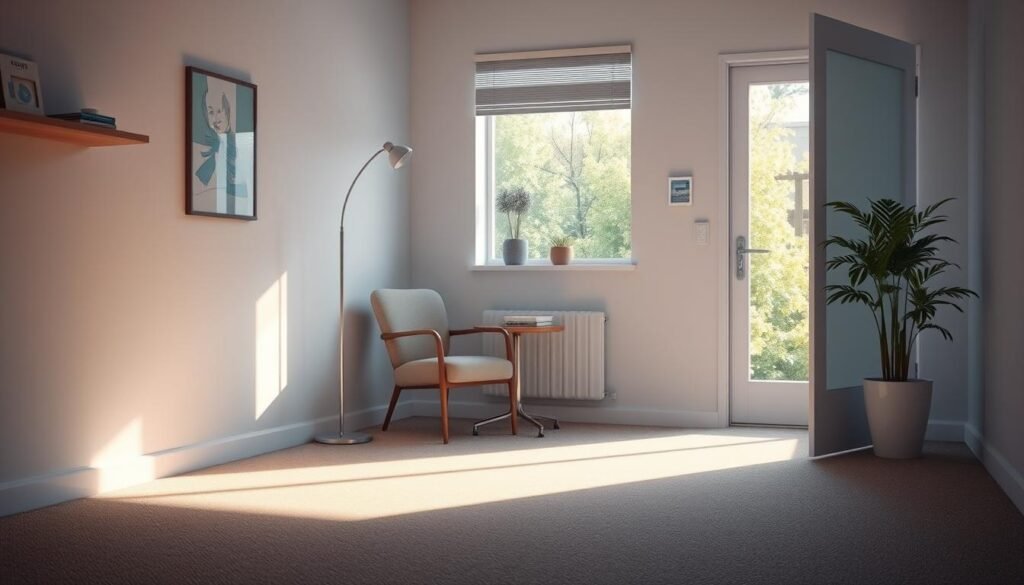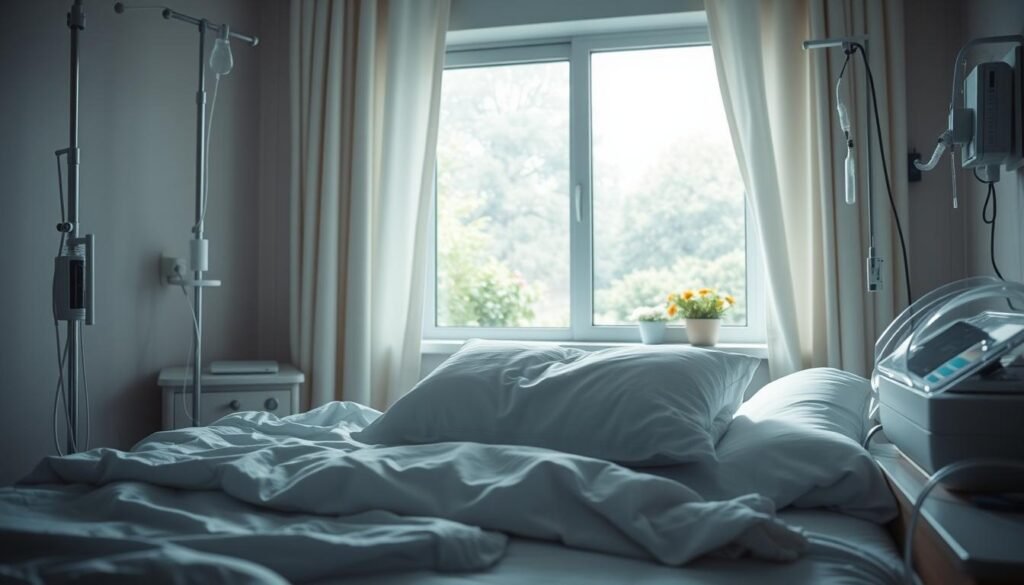About 65% of people with cancer feel very tired at times. This tiredness can last for a long time. It’s a major issue called cancer-related fatigue. Many get it before, during, or even after their treatment. Regular rest doesn’t always help this kind of fatigue. It can make even easy tasks hard to do.
In this guide, we’ll learn about cancer-related fatigue. We’ll look at what causes it and the symptoms it brings. We’ll also talk about ways to manage this fatigue. Plus, we’ll cover how to talk about it with doctors. By knowing more about this fatigue, people can improve their lives during their cancer journey.
Key Takeaways
- Cancer-related fatigue affects roughly 65% of those with cancer.
- Fatigue can last long after treatment has ended, sometimes for years.
- Understanding the differences between cancer fatigue and regular tiredness is essential.
- Certain risk factors can increase the likelihood of experiencing cancer fatigue.
- Effective management strategies can significantly improve quality of life.
What is Cancer-Related Fatigue?
Cancer-related fatigue (CRF) is a deep and unique challenge for many. It is not just feeling tired after exertion. Unlike normal tiredness, CRF is severe and doesn’t improve with rest. This makes everyday tasks hard for those with cancer.
Definition and Comparison to Regular Fatigue
Cancer exhaustion is very different from normal fatigue. Normal tiredness comes from stress or not sleeping enough. But CRF can happen no matter how much you rest. Up to 40% of cancer patients feel this deep tiredness when diagnosed. This number increases with treatment. About 90% on radiation and 80% on chemotherapy feel it. It harms both physical and emotional health. It can make work, socializing, and how you see yourself hard.
Duration and Persistence of Cancer Fatigue
Cancer-related fatigue can last a long time. It’s common during treatment. But many find it stays long after treatment ends. Studies show about one-third of patients feel tired months or years later. This can greatly affect daily life and mood. Caregivers also feel this fatigue. It makes working and personal life challenging for them too.
Understanding the Causes of Cancer Fatigue
Cancer fatigue comes from many sources. Knowing why can help us understand why it hits so many undergoing treatment. Both treatments and the cancer itself play big roles in this tough condition.
The Role of Cancer Treatments
Cancer treatments majorly hike up fatigue levels. Chemotherapy, for example, lowers red blood cell count. This leads to anemia and tiredness. Radiotherapy boosts fatigue as well, sometimes staying long after treatments end.
Moreover, targeted drugs and immunotherapies bring side effects like fever and muscle aches. This makes patients feel even more tired. Hormonal therapies upset hormone levels, which adds to the fatigue. This is common in breast and prostate cancer treatments.
Impact of Cancer Itself on Fatigue Levels
The cancer itself also makes fatigue worse. Disease-related pain can cause a lot of tiredness, especially when strong painkillers are used. Emotional struggles like anxiety and depression play a big part too.
Being less active, eating poorly, and sleeping badly all make fatigue spike. Inflammation from the body’s response can also tire patients out. It signals the brain in a way that makes one feel exhausted.
Symptoms of Cancer-Related Fatigue
Many people getting cancer treatment feel very tired. They face Symptoms of Cancer Fatigue that hit their body, feelings, and mind. Knowing these signs helps them tell doctors what’s going on, leading to better care.
Physical Symptoms
People often feel weak and exhausted, even if they rest. They might have:
- Prolonged feelings of weakness
- Chronic exhaustion that does not improve with rest
- Muscle and joint pain
- Unusual changes in physical strength
These symptoms can last a long time, even after treatment ends. Sometimes, issues like low red blood cell count cause this tiredness.
Emotional Symptoms
Feeling very tired from cancer can also make you feel sad or stressed. You might notice:
- Feelings of sadness or hopelessness
- Increased irritability and mood swings
- Heightened anxiety levels
These feelings can affect how you get along with others. It’s key to get help from doctors and those close to you.
Cognitive Symptoms
This type of fatigue can make it hard to think clearly. Common problems include:
- Difficulties with concentration and focus
- Memory lapses and forgetfulness
- A decreased ability to process information
These issues can mess with everyday life, work, and friendships. It shows why it’s vital to address these symptoms. Tests can help find out what causes this fatigue.
Knowing about the Symptoms of Cancer Fatigue helps you talk to your care team. This knowledge is key to handling tiredness from cancer well.
Describing Your Fatigue to Your Healthcare Team
Talking clearly with your healthcare team about fatigue is key. You should share when your fatigue starts, how long it lasts, and how it changes your everyday tasks. This information lets your care team create the right plan for you. Knowing exactly how fatigue impacts you can make treatments more accurate and helpful.
Importance of Accurate Descriptions
When you talk about fatigue, highlight important parts like:
- Onset: When did the fatigue first appear?
- Duration: How long does the fatigue last?
- Triggers: Are there specific activities that worsen the fatigue?
- Impact: How does it affect daily life and responsibilities?
Sharing this helps doctors understand how serious your fatigue is. A lot of cancer patients, up to 90%, say they feel very tired. That shows why it’s so important to talk clearly about Coping with Cancer Fatigue.
Tools for Measuring Fatigue Levels
There are tools that help measure how tired you are. For example, fatigue scales let you show how bad your fatigue feels. Some scales used are:
| Scale | Description |
|---|---|
| Numeric Rating Scale (NRS) | You rate your fatigue from 0 (no fatigue) to 10 (worst fatigue). |
| Brief Fatigue Inventory (BFI) | It checks how much fatigue affects you and your daily life in the last day. |
| Fatigue Severity Scale (FSS) | This scale sees how fatigue changes your ability to do things and feel on a 7-point scale. |
Using these tools makes talking about fatigue clearer. They help doctors make plans that really match what you need. Adding these tools to your visits can get you the right help for Coping with Cancer Fatigue.
Treatment Options for Cancer-Related Fatigue
Cancer-related fatigue is a big problem for many patients. There are many treatment options. These include drugs and non-medical ways to help. Patients learn about these to improve their energy and life quality.
Medications and Supplements
Some drugs can help with Treatment for Cancer Fatigue. Methylphenidate, a psychostimulant, is one example. It is useful for severe tiredness. Corticosteroids can also boost energy. For anemia, blood transfusions or erythropoietin might be the answer. This drug increases red blood cells.
Vitamins and herbal supplements also help in Managing Cancer Fatigue. They fix deficiencies that cause low energy. Antidepressants might be used when mood issues make fatigue worse. Talking to healthcare providers is key. They customize treatment for each patient.
Non-Medical Interventions
Non-medical methods are crucial too. Exercise is very effective. Aim for 150 minutes of moderate exercise each week. A regular exercise schedule can reduce tiredness a lot.
Psychological support and counseling are important. They help with the mental side of fatigue. Good sleep habits also help. Try to keep a steady sleep time and lessen screen time before bed. This improves sleep, another key in Managing Cancer Fatigue.
For more help, the Cancer-Related Fatigue Clinic at MD Anderson offers customized plans. They focus on what each patient needs.
Tips for Managing Cancer Fatigue
Cancer fatigue requires effective management strategies. It’s vital to use a mix of approaches to feel better. Making certain lifestyle changes is key to lessen the fatigue symptoms.
Physical Activity and Exercise Recommendations
Regular exercise is essential for those with cancer fatigue. Exercising 3 to 5 hours weekly can boost energy levels. Taking part in exercise programs designed by experts helps. They tailor activities to what you can handle.
Nutrition and Hydration Strategies
Good nutrition is critical in managing cancer fatigue. Eating small, balanced meals and snacks keeps your energy up. It’s also crucial to drink 8 to 10 cups of fluids a day. This helps stay healthy and fights off fatigue. Eating right and staying hydrated together improve your life during treatment.
Energy Conservation Techniques
To manage fatigue, save your energy. Short naps in the morning or early afternoon are best. They don’t mess up your night sleep. Also, try to do tasks while sitting and put on your lower clothes first to save energy. Using things like transport chairs for long walks helps keep your energy up all day.
| Strategy | Description |
|---|---|
| Physical Activity | Engage in 3 to 5 hours of moderate exercise weekly, tailored to individual needs. |
| Nutrition | Eat small, well-balanced meals and snacks frequently to maintain energy levels. |
| Hydration | Drink 8 to 10 cups of liquid daily to support overall health and energy. |
| Energy Conservation | Limit naps, sit while dressing, and use mobility aids to save energy. |

Coping Mechanisms for Cancer-Related Fatigue
Coping with cancer fatigue involves many strategies. It includes getting psychological help to manage the emotional and physical burden. Emotional Support for Cancer Fatigue is key to recovery and well-being. Patients benefit from counseling and mental health resources. These help them deal with fatigue’s challenges.
Counseling and Mental Health Support
Counseling gives patients a chance to share their feelings and worries. Techniques like cognitive-behavioral therapy help lower fatigue. They also boost emotional strength. Counseling teaches ways to handle stress from cancer. This includes dealing with anxiety and depression, which can make fatigue worse.
Counselors give patients practical techniques for daily living. These help in managing energy and leading a satisfying life.
Support groups are helpful too. They let people meet others who are in the same boat. Sharing stories builds community and lessens loneliness. These groups offer emotional support and practical tips for dealing with fatigue.
- Consider participating in support groups for shared experiences.
- Utilize relaxation techniques such as meditation and deep breathing.
- Maintain open communication with healthcare providers regarding feelings of fatigue.
- Incorporate mindfulness practices to enhance mental clarity.
Dealing with cancer fatigue is an ongoing process that needs constant support. Using mental health resources helps patients gain back their energy and improve life quality.
When to Call Your Healthcare Team
Cancer-related fatigue is common in patients getting treatment. Knowing when to call your healthcare team is key. It helps manage this issue well.
Spotting the signs of worsening cancer fatigue is important. It ensures you get the right support and care.
Signs of Worsening Fatigue
Patients should watch for signs their fatigue is getting worse. It’s crucial to notice:
- Persistent fatigue that hinders daily activities
- Significant changes in sleep patterns, including insomnia or excessive daytime sleepiness
- New symptoms such as shortness of breath, dizziness, or confusion
- Feeling extremely weak or tired even after adequate rest
Situations Requiring Emergency Attention
Although fatigue is expected, some situations need quick medical help. Urgent care is needed if patients have:
- Severe fatigue with distress or confusion
- Chest pain or significant difficulty breathing
- Signs of dehydration, such as extreme dryness or lack of urination
- Sudden changes in mental status, including confusion or inability to focus

Living with Cancer-Related Fatigue
Cancer-related fatigue deeply affects daily life, changing routines and social interactions. Those with Living with Cancer Fatigue struggle to keep up their old lifestyle. This can harm relationships, causing isolation or frustration.
Impact on Daily Life and Social Interactions
Fatigue can last for weeks to years after treatment. About 65% of cancer patients feel this tough symptom. They may find daily tasks too hard, choosing to rest instead of being social.
This leads to less family time, fewer hobbies, and emotional problems like anxiety and depression. Not being active due to fatigue can make one feel weaker and affect life quality.
Feeling cut off from loved ones becomes more common, showing the need for strong support networks.
Support for Family and Friends
Support from family and friends is key in dealing with fatigue. Teaching them about cancer-related fatigue helps create understanding. Helpful ways include:
- Talking openly about needs and feelings
- Doing relaxing activities together, such as light exercise or hobbies
- Helping with daily tasks to lessen stress
This support makes patients feel less isolated, lightening fatigue’s impact. A caring environment improves coping skills, making it easier to handle Living with Cancer Fatigue.
Understanding Cancer Treatment Side Effects
Knowing the side effects of cancer treatment is crucial for patients. Fatigue is one common side effect, affecting daily life and happiness. Chemotherapy, radiation, and immunotherapy can all lead to fatigue. They do this in different ways.
Relationship Between Treatment and Fatigue
Over 80% of people receiving chemotherapy or radiation feel tired. This is because treatment can harm both cancerous and healthy cells. The resulting tiredness may start soon after therapy. And it might last well beyond the end of treatment.
Blood cancers like leukemia lead to more fatigue. This is due to their impact on bone marrow. Breast and prostate cancers change hormone levels, also causing tiredness. And, cancer in the gastrointestinal system affects how food is processed, making the fatigue worse.
Surgery often makes patients tired as their bodies heal. Pain relief drugs post-surgery can also make patients feel more tired. Anemia, losing appetite, and not sleeping well also play big roles in treatment-related fatigue.
Feeling tired can range from being a little tired to having no energy at all. It’s important for patients to talk to their doctors about it. Talking about what causes the fatigue and how to treat it can help a lot.
| Treatment Type | Onset of Fatigue | Duration | Common Contributing Factors |
|---|---|---|---|
| Chemotherapy | Days after treatment | Varies per individual | Healthy cell damage, anemia |
| Radiation Therapy | Midway through treatment | Weeks to months post-treatment | Energy depletion, inflammation |
| Surgery | Immediately post-surgery | Gradually decreases with healing | Pain medications, energy expenditure |
| Immunotherapy | Weeks to months after initiation | Can occur at any time | Body’s immune response, inflammation |
| Hormone Therapy | Varies by treatment | Can last as long as treatment | Hormonal fluctuations |

Understanding and recognizing treatment side effects is key. This knowledge helps patients manage their expectations. Being prepared for fatigue lets people adjust their lives. They can find ways to cope. This all leads to a better treatment experience.
Integrative Approaches to Manage Cancer-Related Fatigue
Cancer-related fatigue is tough for many people getting treatment. Integrative methods aim to help the whole person to get better and feel well again. By adding in other therapies, people can find some relief from severe tiredness. This makes life better for them.
Complementary Therapies
Complementary therapies are key in dealing with cancer-related tiredness. Things like acupuncture, yoga, and light stretching help with rest and recovery. Tai chi and qigong are shown to reduce tiredness during and after treatment. Using these therapies together helps with managing fatigue and improves mental health too.
Benefits of Mindfulness and Relaxation Techniques
Mindfulness and relaxation techniques are great for fighting cancer fatigue. Meditation and guided imagery help clear the mind and lessen stress. Studies show that these mindfulness programs make a big difference in fatigue. They bring a sense of control and peace, helping people tackle their problems better. When combined with regular treatments, these methods can enhance recovery outcomes.
Conclusion
Cancer-related fatigue greatly affects patients’ lives during and after treatment. It’s very common, with 60–96% of those treated for cancer feeling very tired. This fatigue can last for years and hurt their quality of life.
This condition isn’t just about feeling physically tired. It includes emotional and mental tiredness too. Understanding it is key for everyone involved.
Handling this fatigue well can help patients live better. Knowing the causes, symptoms, and treatments is important. Patients and doctors need to work together to care better.
Self-care, talking openly, and getting the right support are important. They help a lot with managing the fatigue that comes with cancer.
Finally, fighting cancer-related fatigue is crucial to get better health outcomes. Studies show we need to be more aware and active in dealing with it.
For more details on managing cancer tiredness, check out this research article. By working together, survivors can improve their lives and well-being.